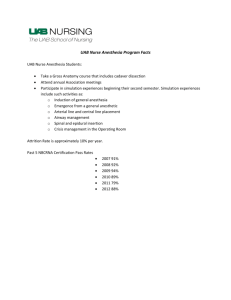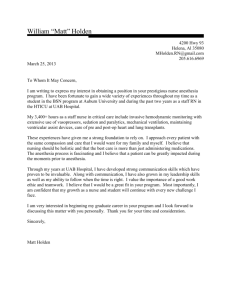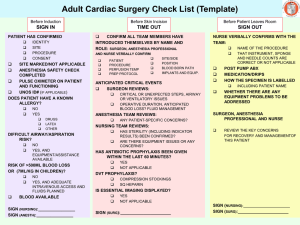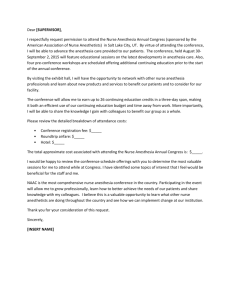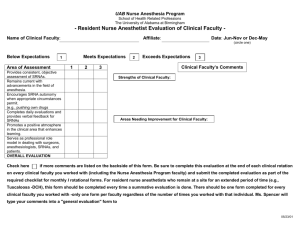BOSTON COLLEGE PROGRAM IN NURSE ANESTHESIA GRADUATE STUDENT HANDBOOK ADDENDUM 2005-2006
advertisement
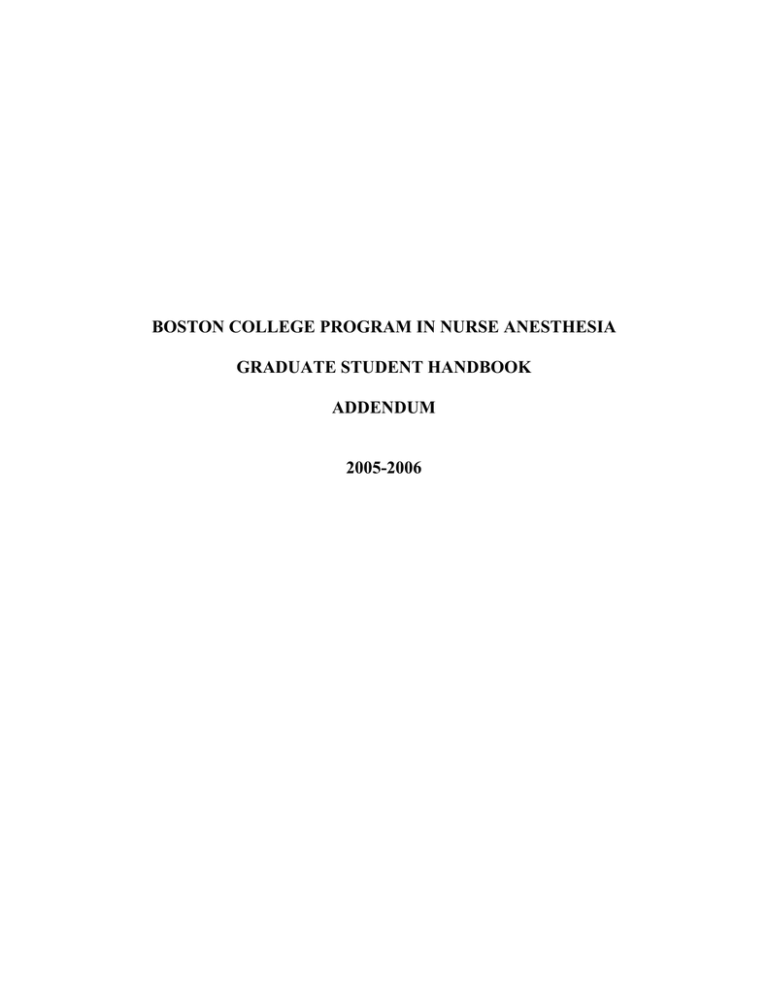
BOSTON COLLEGE PROGRAM IN NURSE ANESTHESIA GRADUATE STUDENT HANDBOOK ADDENDUM 2005-2006 Table of Contents Introduction 1 Mission Statement 1 Educational Philosophy 1 Master’s Program Objectives 2 Nurse Anesthesia Program Objectives 3 Master’s in Nursing with Nurse Anesthesia Specialty Curriculum 4 Accreditation 5 Admission Requirements 5 Anesthesia Care Plans 6 Assignments 6 Attendance 6 Blood Borne Pathogen 6 Call 7 Clinical Affiliations 7 Dress 8 Employment 8 Evaluations 8 Health Insurance 8 Holidays 9 Leave of Absence 9 Liability Insurance 9 Monthly Case Records 9 Pagers 9 Parking 9 Policy Revisions 10 Post-Anesthesia Visits 10 Pre-Anesthesia Visits 10 Sick Time 10 Supervision 10 Vacation Time 10 INTRODUCTION These pages are meant to serve as an addition to the Graduate Student Handbook published by Boston College School of Nursing. All of the information contained in the handbook pertains to students in the Program in Nurse Anesthesia, however, because the Program in Nurse Anesthesia requires additional matters specific to the specialty to be addressed, this addendum has been developed. MISSION STATEMENT The mission of the Boston College School of Nursing is to prepare professional nurses whose practice reflects a humanistic ethic and is scientifically based, technically competent, and highly compassionate. The Boston College nurse learns to think critically and to develop leadership skills. The faculty of the school aim to develop and disseminate knowledge for the advancement of professional practice and the improvement of health care by providing an environment that supports the personal development and scholarship of its faculty and students. The mission of Boston College School of nursing is congruent with that of its parent institution, with an emphasis on the development of the whole person. The School of Nursing focuses on preparing each student as a life-long learner, as a health professional and as a person who will use knowledge in service to others. The mission of the Boston College Program in Nurse Anesthesia is to prepare graduates to excel as advanced practice care-givers and leaders. It is the belief that the role of the nurse anesthetist is based upon a foundation of ethical principles and patient advocacy. The goal of the program is to provide a climate of professional growth through the marriage of strong academics and clinical practice. The advanced practice nurse anesthetist is prepared to promote nursing through leadership, mentorship, and researchbased practice. Fundamental to the mission of the program is the inherent value of the individual and the commitment to society. EDUCATIONAL PHILOSOPHY Nursing is the art and science of human caring for patients. The recipients of nursing care are individuals, families, aggregates of people, and communities who are sick and well; culturally and linguistically diverse; within all socioeconomic strata; and at all stages in the life cycle. The study of nursing is based on a common intellectual heritage transmitted by a liberal education and the art and science of nursing. Nursing activities focus on the life processes and patterns of the individual in the context of family and community. Nursing recognizes the contribution of cultural diversity and social environments to the health/illness beliefs, practices, and behavioral responses of individuals and groups. -1- Nurse anesthesia education prepares students for the appropriate level of knowledge and skills by building on the liberal arts and sciences. The nurse anesthesia curriculum is logically ordered to provide core knowledge and the application of that knowledge. Specialty courses prepare students for holistic care and require a holistic approach in education. Students are supported in developing clinical skills as well as the ability to think and act ethically. Students are active participants in shaping the learning environment within the School of Nursing and the Program in Nurse Anesthesia. The Boston College School of Nursing instills the values of service to others, truth through scholarly inquiry, and justice through promoting equal access to care for all people. Service, scholarship, and justice in caring include all people in the global community, particularly the under-served. The faculty believes that promoting the physical, psychological, and spiritual aspects of health are essential to understanding the human dimension. The nurse respects the uniqueness of the person and the individual’s right to choose and actively participate in decisions about health care. Nursing promotes self-determination by empowering clients and advocating for those who cannot do so independently. MASTER’S PROGRAM OBJECTIVES (Accepted by Faculty Assembly May 9, 2001) 1. Implement a philosophy of nursing congruent with the Judeo-Christian values that support the intrinsic worth of each human being; 2. Incorporate theory, research and values within a conceptual framework for nursing practice; 3. Generate clinical judgements (diagnostic, therapeutic, and ethical) to guide the selection and evaluation of nursing interventions for complex health problems; 4. Use outcome criteria to evaluate effectiveness of clinical practice; 5. Identify researchable questions that arise from clinical practice; 6. Use current knowledge to provide high quality health care, initiate change, and improve nursing practice; 7. Coordinate care for clients from diverse populations across health care systems; 8. Collaborate with clients and other professional to promote quality care; 9. Implement the role of the advanced practice nurse (clinical nurse specialist or nurse practitioner) within a specialized area of clinical practice; 10. Articulate the role of the advanced practice nurse and its influence on health care and policy on local, state, national, and global levels. -2- NURSE ANESTHESIA PROGRAM OBJECTIVES 1. Perform a detailed and complete pre-anesthetic assessment including obtaining a history and physical examination, reviewing laboratory data and pertinent information from the patient’s medical record. 2. Develop a plan of anesthesia care based on scientific theory related to the patient’s past medical and nursing history, current status, and surgical requirements. 3. Implement an anesthetic plan utilizing a broad spectrum of techniques based on sound physiology and established guidelines. 4. Incorporate patient safety considerations with regard to equipment check, positioning, and anesthetic administration. 5. Evaluate and adapt the anesthetic plan based on patient response, surgical considerations, utilizing physiologic and pharmacologic theories. 6. Demonstrate the ability to utilize a variety of anesthetic modalities including general and regional anesthetic techniques to patients across the lifespan. 7. Demonstrate the ability to utilize various invasive and non-invasive monitoring techniques and to interpret information obtained from them. 8. Utilize effectively a variety of non-anesthetic pharmacologic agents commonly used as adjuncts to anesthesia practice. 9. Rapidly synthesize essential information to develop and implement a plan of anesthesia care for emergency and trauma patients. 10. Develop and implement a plan of fluid and temperature management based on physiologic considerations. 11. Evaluate the patient post-operatively insuring patient safety and comfort identifying and consulting on any anesthesia-related complications. 12. Incorporate the study and evaluation of current literature into practice. 13. Function as a leader and resource in the area of airway management and critical care and a member of the cardiopulmonary resuscitation team. 14. Demonstrate the qualities of the self-directed learner, striving to add knowledge and improve practice through self-critique. -3- 15. Maintain legal and ethical standards of practice accepting responsibility for one’s own actions and judgments. 16. Maintain legal and ethical standards of practice accepting responsibility for one’s own actions and judgments. MASTER’S IN NURSING WITH NURSE ANESTHESIA SPECIALTY Year One Spring NU 420 NU 415 NU 672 NU 490 NU 491 Pharmacotherapeutics in Advanced Nursing Practice Conceptual Basis for Advanced Nursing Practice Pathophysiologic Processes Physiologic Variables for Nurse Anesthesia I: Respiratory Chemistry and Physics for Nurse Anesthesia Practice Credits 3 3 3 3 3 Summer NU 492 NU 493 NU 494 NU 520 NU 430 Basic Principles of Nurse Anesthesia Pharmacology of Anesthetics and Accessory Drugs Physiologic Variables for Nurse Anesthesia II: Cardiovascular Nursing Research Theory Advanced Health Assessment Across the Lifespan 3 3 3 3 3 3 NU 417 (Choose 1) Clinical Practicum in Nurse Anesthesia I Physiologic Variables for Nurse Anesthesia III: Neurological, Endocrine and Renal Advanced Practice Nursing within Complex Healthcare Systems Research II (choose on of three options: NU 523, NU 524 or NU 525) Spring NU 592 NU 593 NU 416 Advanced Principles for Nurse Anesthesia Practice Clinical Practicum in Nurse Anesthesia II Ethical Issues in Advanced Nursing Practice 3 3 3 Summer NU 595 Clinical Practicum in Nurse Anesthesia III 3 Fall NU 692 Nurse Anesthesia Residency I 3 Spring NU 693 Nurse Anesthesia Residency II 3 Year Two Fall NU 591 NU 590 3 3 3 Year Three Total Credits = 56 -4- ACCREDITATION The Master’s degree program is accredited by the Commission on Collegiate Nursing Education. Commission on Collegiate Nursing Education One Dupont Circle, NW, Suite 530 Washington, D.C. 20036 Tel: 202-887-6791 The Program in Nurse Anesthesia is accredited by the Council on Accreditation of Nurse Anesthesia Educational Programs effective October 12, 2002. Council on Accreditation of Nurse Anesthesia Educational Programs 222 S. Prospect Ave. Park Ridge, IL 60068-4001 Tel: 847-692-7050 POLICIES (Revised December 1, 2004) These policies are not meant to replace but rather be in addition to policies of the Boston College School of Nursing. Admission Requirements To be considered for admission to the Program in Nurse Anesthesia, candidates must meet the following criteria: 1. Possess a B.S. in Nursing from a nationally accredited program 2. Be licensed as a Registered Nurse with the Commonwealth of Massachusetts* 3. Possess a minimum of 1 year of critical care experience as an RN 4. Obtain official transcripts of all prior post-secondary academic work 5. Demonstrate an undergraduate scholastic average of B or better 6. Provide a statement of goals pertaining to career objectives and how the program will help in achieving those goals. 7. Provide 3 letters of reference pertaining to academic ability and professional competency. 8. Provide an official report of GRE scores (taken within 5 years) 9. Successful completion of an undergraduate statistics course 10. Possess current ACLS and PALS certification ** *The student’s Massachusetts RN license must be current and active at all times. Failure to maintain a current license will result in the student being removed from the clinical area. -5- ** ACLS and PALS certification must be maintained by the student. A personal interview will be scheduled only after all documentation is complete. Immunizations and health clearance are required prior to enrollment. Clinical sites may require additional documentation which must be obtained by the student at their own expense. Individual RN coverage by professional liability insurance is mandatory for all clinical practica. This requirement is met by the purchase by the student of student nurse anesthetist liability insurance. Anesthesia Care Plans A plan of anesthesia care is to be completed on all patients the form of which is dictated by the student’s level of experience. Beginning students will follow the established written format directly while more experienced students may present a verbal plan to the CRNA or MD preceptor. Assignments To the Facility: Student assignment to the facility will be the responsibility of the Program Director and Assistant Program Director. Individual student interest and geographical considerations will be weighed whenever possible but is not guaranteed. Daily Assignments: The daily assignment of the student to specific cases is the responsibility of the Clinical Coordinators/CRNA managers in conjunction with the Chairmen of anesthesia at the facility or his designee. Attendance It is the belief of the faculty of the Program in Nurse Anesthesia that participation in all classroom and clinical activities is essential to successful completion of the program. Students are expected to be present for all didactic classes, clinical experiences, and clinical conferences. Any unexplained absence will be brought to the attention of the Program Director. Illness, environmental (weather), and family emergencies will be taken into consideration. Blood Born Pathogen Pathogen Exposure: As part of their clinical nursing courses students are responsible to use precautions to prevent exposure to or transmission of pathogens. It is the student’s responsibility to put the appropriate techniques into practice when caring for patients in the specific clinical setting. The Kennedy Resource Center has information about the latest policies and procedures from OSHA and CDC. If exposure occurs, the student must immediately inform her/his preceptor and faculty advisor and follow agency protocols. A written report of the incident also must be provided to the Graduate Office. -6- Needlestick Injuries: Students are expected to take precautions to prevent needlestick injury in the clinical area. If such an injury occurs, the faculty member should be notified immediately and a written report should be provided to the Graduate Office. Exposure to Blood Born Pathogen: Immediate assessment and confidentiality are critical issues and direct the following actions: If a student, or faculty member, while engaged in clinical practice activities has an exposure to potentially infected body fluid from a client, the first action is to: a. IMMEDIATELY remove soiled clothing and wash the exposed area with soap and water. b. Notify faculty member. c. Report to nearest emergency room on site at the agency or as directed by the University Health Service. d. Identify self as student/faculty with a possible HIV/HBV exposure. e. Give close attention to filling out the Accident Report for the agency, School of Nursing and University Health Services. A copy of the agency report form must be forwarded to the Office of the Dean, School of Nursing within 72 hours of exposure. Boston College, in the position of guarantor, will assume the financial responsibility, if necessary, for emergency assessment and interventions through the first 72 hours after the exposure incident occurs. No member of the Boston College community, either student or faculty, shall be denied medical evaluation and counseling based on immediate fee-for-service. Call Invaluable experience can be gained by providing anesthesia care during off-shift hours. For this reason students will be assigned to be on-call no more than once per week during select rotations. These on-call assignments may include a weekend shift, however at no time will the student be assigned to either the clinical area or the classroom on a day following an overnight call. A CRNA or MD preceptor will be present at all times within the operating room suite when the student is on call. Clinical Affiliations Clinical experiences will be coordinated utilizing the multiple facilities for whom Anaesthesia Associates of Massachusetts provides anesthesia services. These sites include Boston Medical Center, New England Baptist Hospital, Faulkner Hospital, Saints Memorial Hospital, Quincy Medical Center, Deaconess Glover Hospital, and Mt. Auburn Hospital. -7- Dress It is expected that students will dress appropriately at all times. Proper operating room attire will be adhered to based on individual hospital policy. The attire for students outside the operating room at the clinical site should reflect the professional nature of nurse anesthesia practice. Employment Students may be employed during the program as long as there is no conflict in time between employment and student responsibilities. The decision of a student to work as a registered nurse during the program is the student’s alone but is not encouraged. Should a student’s academic or clinical performance appear to suffer from such employment, the student will be counseled to work less or not at all as acceptable performance will be essential to success and progression in the program. Students may not work the shift prior to a clinical anesthesia commitment and will not be excused from a call assignment because of outside employment. Students may not be employed to practice anesthesia and at no time is a student to perform a skill attained as an anesthesia student while functioning as a registered nurse. Evaluations Daily Clinical Evaluation: Students will be evaluated daily by the preceptor while in the clinical area. All evaluations are meant to be constructive and are designed to help the student to grow and develop as a nurse anesthesia student. These evaluations will be kept on file in the Program Director’s Office. Any recurrent problem will be brought to the attention of the Program Director. It is the student’s responsibility to obtain an evaluation each day and submit these to the nurse anesthesia program office weekly. Summary Evaluation: Students will be evaluated at the completion of each term or rotation in the clinical area. These evaluations will be coordinated by the CRNA Managers/Clinical Coordinators in conjunction with the Program Director and Assistant Program Director. These evaluations should be a summary and a reflection of the daily evaluations and should identify both strengths and learning needs. A satisfactory evaluation is necessary for progression in the program. Student self-evaluations will be an integral part of the process. Final course grade is the responsibility of program faculty. Health Insurance The Commonwealth of Massachusetts has mandated that all students, graduate and undergraduate, taking at least 75% of full-time credit hours must be covered by medical insurance providing a specified minimum coverage. Students in the School of Nursing who register for 7 or more credits are considered 75% full-time. Boston College will offer all students the option of participating in the plan offered at the University or submitting a waiver. -8- Holidays The following holidays will be observed by the Boston College Program in Nurse Anesthesia during the clinical phase of the program: New Year’s Day Memorial Day Independence Day Labor Day Thanksgiving Day Christmas Day Because each facility determines its own operating room schedule for other minor holidays, students will receive 4 float holidays which may be taken in exchange for working one of these minor holidays. Leave of Absence Leaves of absence are not normally granted for more than 1 semester at a time. Students may obtain the Leave of Absence Form from the Graduate Programs Office and submit this form to that office for the Dean’s approval. Leaves of absence for students in the Program in Nurse Anesthesia are not encouraged and should be discussed with the Program Director. The full-time nature of the curriculum and the limited clinical sites necessitates careful planning if all students are to be placed in the clinical practica. Liability Insurance Students in the Program in Nurse Anesthesia will participate in the Professional Liability Insurance Program for Student Nurse Anesthetists and Nurse Anesthesia Education programs provided by the AANA Insurance Services. The cost of such liability insurance will be borne by the student. Monthly Case Records Students will be required to maintain a daily record of all anesthesia experiences utilizing the Typhon Group: Anesthesia PRO Tracking Administration system and the cost for this will be born by the student. The case record must be current at all times. Pagers Students will be provided with a pager at the beginning of Clinical Practicum I. Students are requested to keep their pagers on for the during their tenure in the program. Lost or broken pagers should be reported to Rita McNulty at AAM (781) 407-0571 immediately. Parking and Transportation Students are expected to comply with all rules and regulations regarding parking while at the Boston College campus or at the various clinical sites. Students must provide their own transportation to the clinical sites. A fee for parking may be required and facilities may require the student to park off-site. -9- Policy Revisions Student Handbook Addendum will be reviewed annually during the Fall semester. Any changes to these policies will be voted on by the Nurse Anesthesia Program Committee. Policy changes which may have substantive impact on the School of Nursing or the college will be brought to the Educational Policy Committee and/or the Faculty Assembly as appropriate for a vote. Post-Anesthesia Visits The student will visit all patients in the PACU for whom they have provided anesthesia care. In addition, they are responsible for completing a post-operative visit on any patient who is admitted to the hospital overnight. Pre-Anesthesthetic Visits The student is responsible for identifying the location of his/her patient. All in-house patients will be seen the evening prior to surgery for the purpose of performing a preanesthesia assessment. In the case of same day surgical admissions, the student is responsible for the information located on the pre-anesthesia assessment form completed during the pre-admission testing center visit. The student will also interview the patient in the preop holding area and note any interval changes in patient assessment. The student may also be assigned preop visits during the course of their clinical day by the physician in charge. Sick Time Students who are ill on a day when they are assigned to the clinical area must call the Anaesthesia Associates of Massachusetts message line (877) 249-4666 prior to 6 am. Students should also contact the nurse anesthesia program office at (617) 552-2756. Excessive absences will be brought to the attention of the Program Director and it may be necessary for the student to make up the time after the normal completion of the program Supervision The ratio of students to instructors in the clinical area is based on the student’s knowledge and ability, the physical status of the patient, the complexity of the anesthetic and/or surgical procedure, and the experience of the instructor. At no time will the ratio of student to instructor exceed 2:1 (students:instructor). Vacation Time Students will have the benefit of regularly scheduled vacation periods as determined by Boston College during the first 4 semesters of the program. During the last 15 months (Clinical Practicum III and Nurse Anesthesia Residencies I and II) students will have a total of 15 days of earned time (vacation and sick time). All vacation time must be approved by the Program Director and Clinical Coordinators and there will be a limitation on the number of students away at any given time. -10-
